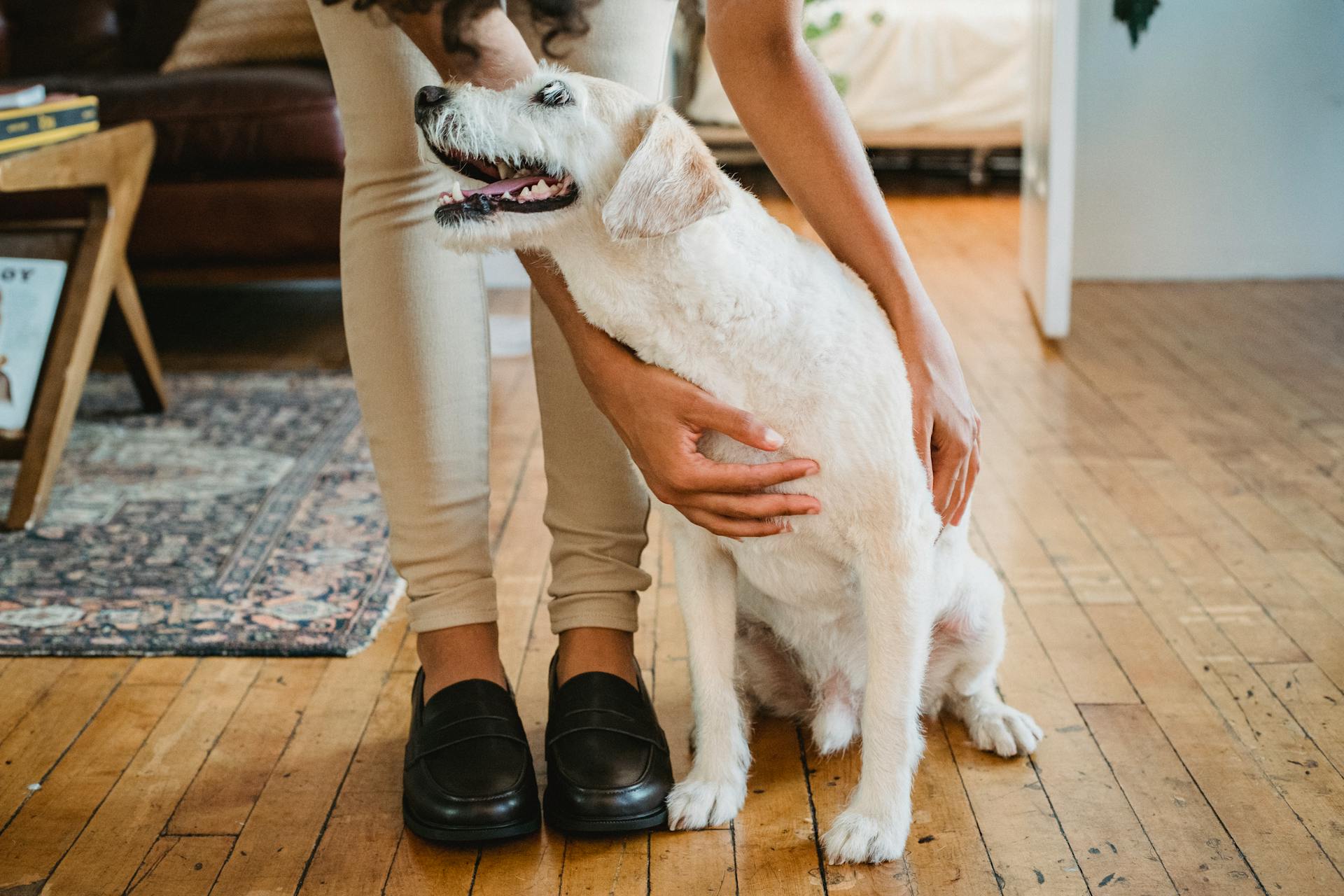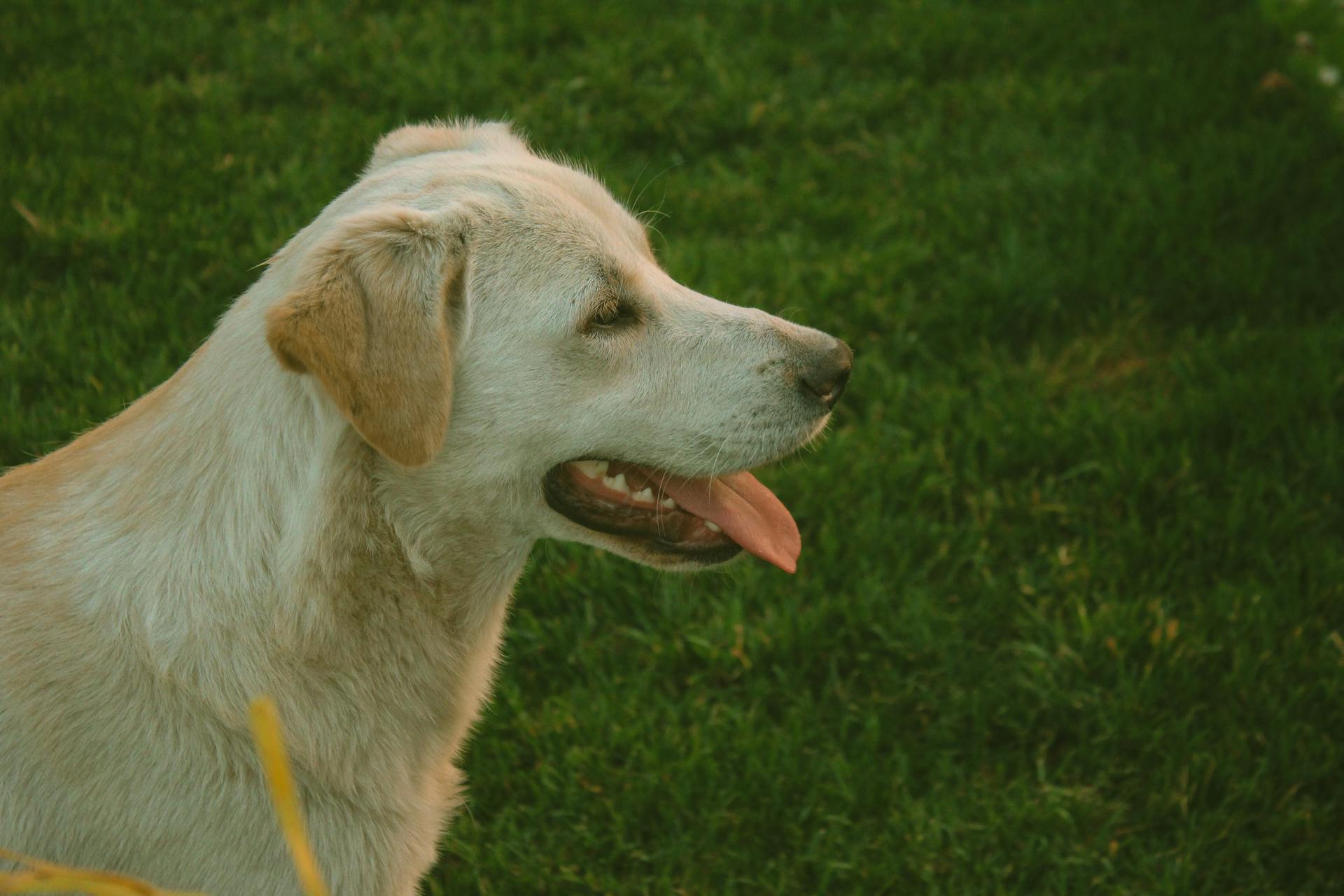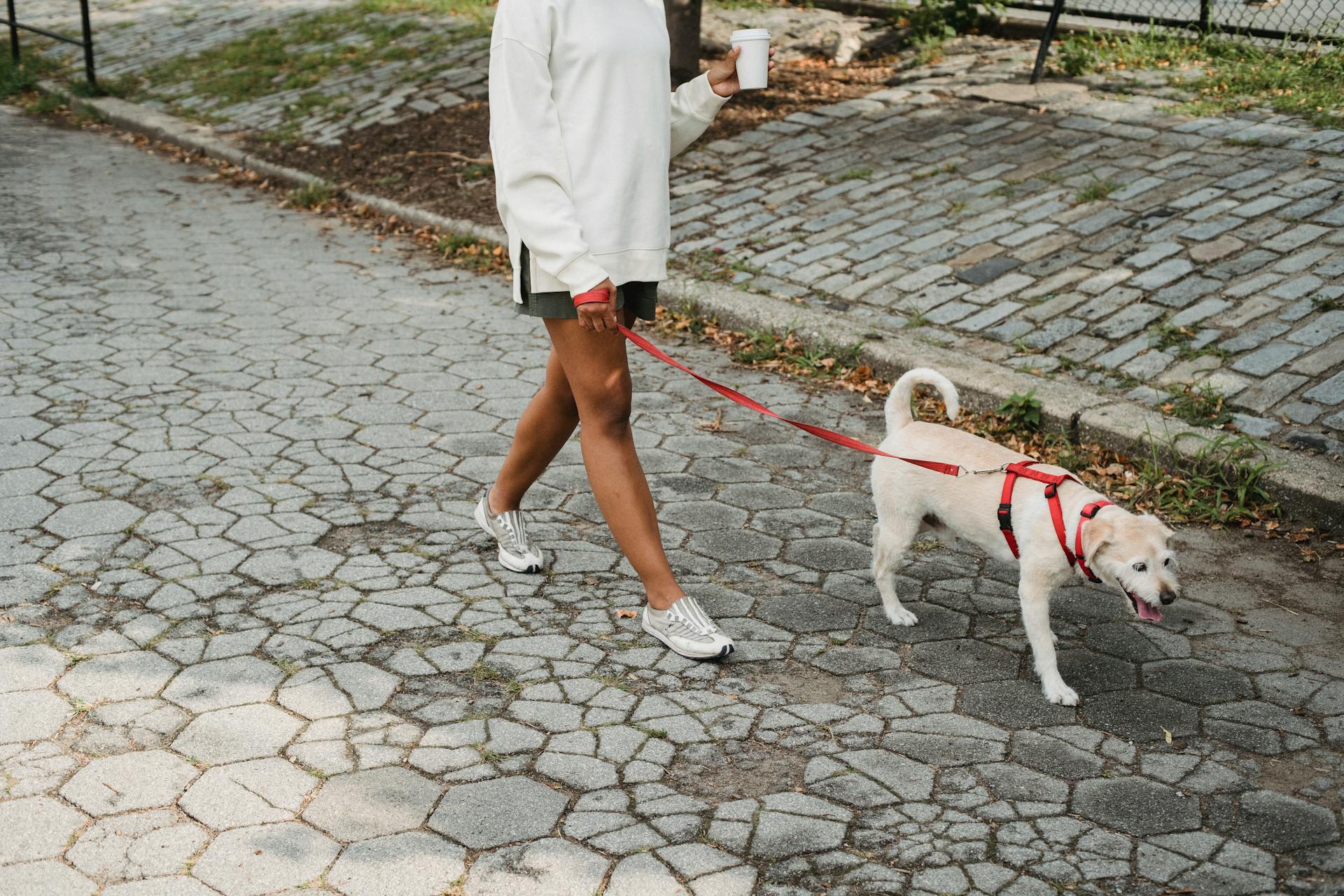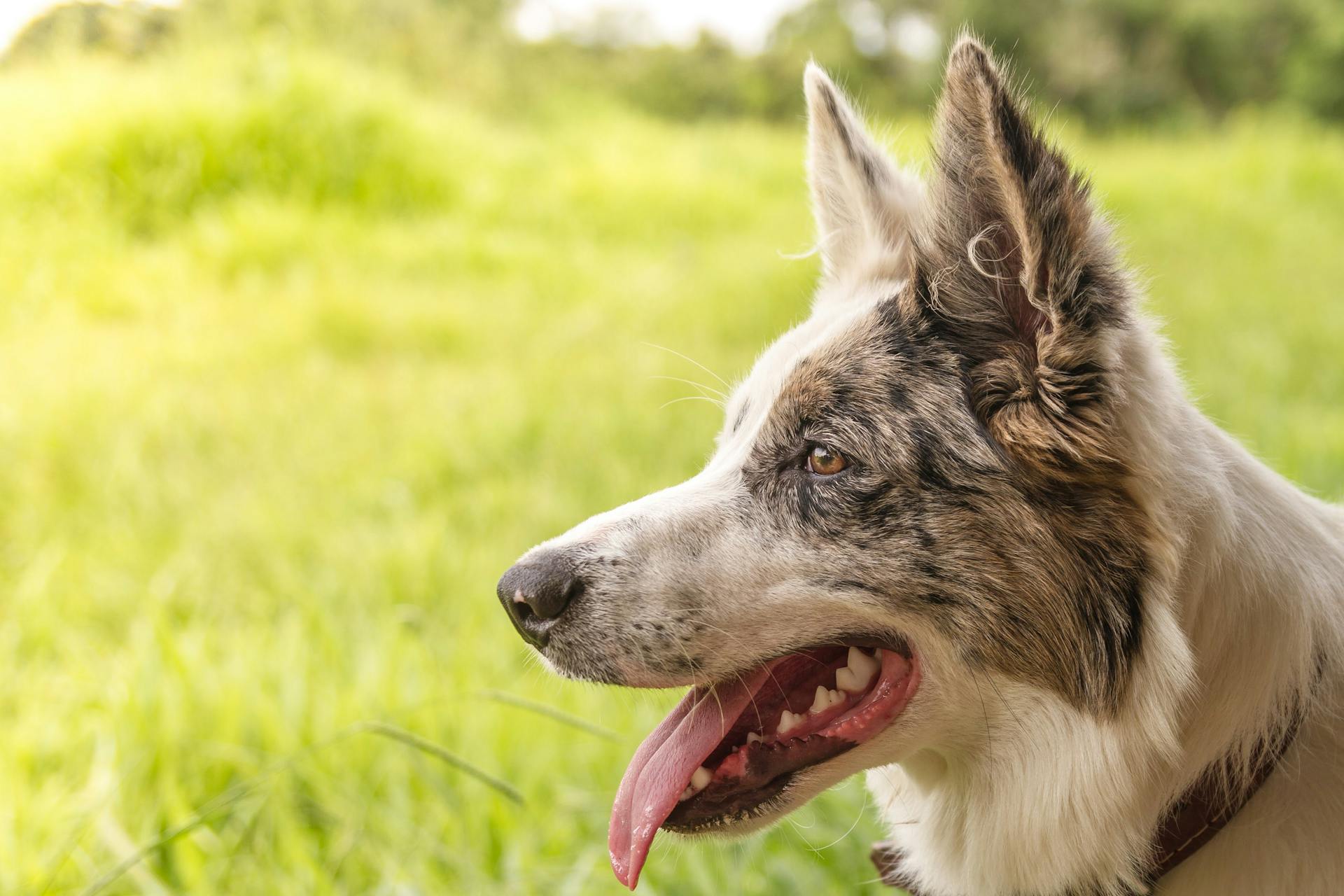
If your female dog is panting and restless, it's likely a sign that something's off. She might be feeling anxious or stressed, which can be caused by separation anxiety, loud noises, or changes in her environment.
Panting can also be a sign of overheating, especially if she's been exercising or playing outside in hot weather. In this case, providing her with a cool, quiet space to rest can help her calm down.
As a dog owner, it's essential to monitor your dog's behavior and body language to identify the underlying cause of her panting and restlessness. Pay attention to her tail, ears, and posture, as these can give you clues about her emotional state.
Additional reading: Dog Names Female Start with S
Causes of Panting
Panting is a normal behavior for dogs, but excessive panting can be a sign of an underlying issue. Dogs take between ten and thirty breaths a minute, depending on their size, and panting helps them cool off when they're hot or engaged in vigorous exercise.
Some breeds, like Boston terriers, bulldogs, and pugs, are prone to heavier breathing than other dogs due to their short snouts. However, heavy panting can also be a sign of heatstroke or poisoning.
Dogs may pant heavily due to chronic illness, such as heart failure, Cushing's syndrome, or respiratory disorders. These conditions can lead to breathing difficulties, reduced exercise tolerance, and coughing.
Injury and pain can also cause a dog to pant heavily. Dogs can't tell us with words when they're in pain, so it's essential to look for other signs, such as enlarged pupils, reduced appetite, and restlessness.
Medications, such as prednisone, can also lead to heavy panting in dogs. If you suspect your dog's medication is causing heavy panting, talk to your veterinarian.
Here are some common causes of heavy panting in dogs:
- Heatstroke or poisoning
- Chronic illness (heart failure, Cushing's syndrome, respiratory disorders)
- Injury and pain
- Medications (prednisone and others)
If you're concerned about your dog's panting, it's always a good idea to consult with a veterinarian to rule out any underlying conditions.
Symptoms and Signs
If your female dog is panting and restless, it could be a sign of hyperventilation. Hyperventilation is characterized by rapid, shallow breathing, which can lead to a range of symptoms.
Rapid breathing is a key sign of hyperventilation in dogs. You may notice your dog breathing heavily or with an open mouth. This is because they're not getting enough oxygen to their body.
Other symptoms of hyperventilation include a rapid heart rate, blue gums, excessive panting and drooling, weakness or dizziness, collapse or fainting, and snorting or wheezing.
Here are some of the main symptoms of dog hyperventilation:
- Rapid breathing, heavy breathing, or open-mouth breathing
- Rapid heart rate
- Blue gums
- Excessive panting and drooling
- Weakness or dizziness
- Collapse or fainting
- Snorting or wheezing
Signs of Hyperventilating
Hyperventilation in dogs is a serious condition that can have severe consequences if left untreated. Rapid breathing, heavy breathing, or open-mouth breathing are all signs of hyperventilation in dogs.
Rapid heart rate is another common symptom of hyperventilation in dogs. This is because the body is trying to compensate for the lack of oxygen.

Blue gums can be a sign of oxygen deprivation, which is a common result of hyperventilation in dogs. If you notice your dog's gums turning blue, it's essential to seek veterinary attention immediately.
Excessive panting and drooling are also common symptoms of hyperventilation in dogs. If your dog is panting and drooling excessively, it may be a sign that they're not getting enough oxygen.
Weakness or dizziness can be a sign of hyperventilation in dogs, especially if it's caused by a lack of oxygen. If you notice your dog acting weak or dizzy, it's crucial to seek veterinary attention.
Collapse or fainting is a severe symptom of hyperventilation in dogs. If your dog collapses or faints, it's essential to seek emergency veterinary attention.
Snorting or wheezing can be a sign of hyperventilation in dogs, especially if it's caused by a respiratory issue. If you notice your dog snorting or wheezing, it's crucial to seek veterinary attention.
Here are the main symptoms of dog hyperventilation:
- Rapid breathing, heavy breathing, or open-mouth breathing
- Rapid heart rate
- Blue gums
- Excessive panting and drooling
- Weakness or dizziness
- Collapse or fainting
- Snorting or wheezing
Monitor Sound Changes

Some dogs make abnormal snorting sounds while panting due to a long soft palate or excessive tissue in the throat that causes obstruction of the airway.
Dogs with short snouts like Pugs and English Bulldogs are more likely to make these abnormal sounds.
Labradors and Golden Retrievers are predisposed to a condition called laryngeal paralysis, which causes an abrasive sound when they pant.
This condition makes them more prone to heatstroke because they can't efficiently pant to cool themselves.
Changes in your dog's panting sounds are a warning sign that shouldn't be ignored.
Suggestion: Dogs Pant
Other Symptoms
If your dog is panting and showing other symptoms, it's essential to take notice.
Lethargy, or a lack of energy, can be a sign that something is wrong.
Not eating well is another red flag, as a decrease in appetite can be a symptom of underlying health issues.
Panting and shaking can be a combination of symptoms that indicate your dog is not feeling well.
Coughing is a symptom that should not be ignored, as it can be a sign of respiratory problems.
Gray, blue, or bright red gums can be a sign of anemia or other underlying health issues.
Additional reading: Female Heeler Dog Names
Prevention and Treatment
If your female dog is panting and restless, it's essential to identify the underlying cause to provide the right treatment. In some cases, hyperventilation can be a sign of an underlying medical condition, so it's crucial to seek help from a veterinarian.
A common cause of panting and restlessness in dogs is stress and anxiety. If you suspect your dog is hyperventilating due to stress, try to avoid triggers and plan ahead by giving her soothing treats like Calming Hemp Chews from Pet Honesty.
Dogs with allergies can also experience hyperventilation, so if you suspect allergies are the cause, try giving her AllergyImmunity Chews, which contain probiotics and other ingredients that may help support digestion and immune health.
If your dog's panting and restlessness are caused by an underlying medical condition, your veterinarian may try to cool down her body temperature or reduce anxiety and excitement by using a sedative. They may also use a combination of bronchodilators and antihistamines if allergies are behind the breathing troubles.
A unique perspective: Why Is My Female Dog Shedding so Much
In severe cases, your veterinarian may put your dog on oxygen or perform surgery to remove obstructions that cause hyperventilating. If you suspect your dog is suffering from heatstroke or poisoning, take her to a veterinarian immediately.
Here are some common reasons dogs pant heavily, along with possible treatments:
- Heatstroke or poisoning: Seek veterinary care immediately and try to cool your dog safely.
- Chronic illness: Treatment varies depending on the condition, but may include medications or surgery.
- Injury and pain: Seek veterinary care right away, as heavy panting can be a sign of internal injuries.
- Medication: Talk to your veterinarian if you think your dog's medication is causing heavy panting.
By understanding the possible causes of panting and restlessness in dogs, you can take steps to prevent and treat the issue.
When to Seek Help
If your dog's panting and restlessness persist or worsen over time, it's crucial to seek help from a veterinarian.
A dog's panting can be a sign of underlying medical issues, such as heatstroke or anemia, as mentioned in the section on "Causes of Panting".
If your dog's behavior changes suddenly, such as becoming more aggressive or withdrawn, it may be a sign of a more serious issue that requires immediate attention.
When to See a Vet
If you notice your dog's panting starting suddenly, it's best to err on the side of caution and seek veterinary help right away. Sudden panting can be a sign of a serious issue, such as heatstroke.
If you think your dog may be in pain, don't hesitate to call your vet. Pain can cause panting, and it's essential to address the underlying issue.
Constant and intense panting is also a cause for concern. If your dog is panting excessively, it may be a sign that they're not getting enough oxygen.
If your dog's tongue or gums appear blue, purple, or white, it's a sign that they're not getting enough oxygen. This is a medical emergency, and you should seek help immediately.
Here are some key signs that warrant a vet visit:
- Sudden panting
- Panting in pain
- Constant and intense panting
- Tongue or gums appear blue, purple, or white
Remember, it's always better to be safe than sorry when it comes to your furry friend's health. If you're ever in doubt, don't hesitate to reach out to your vet for guidance.
If Accompanied by Other Symptoms
If your dog's panting is accompanied by other symptoms, it's essential to take action. Lethargy and loss of appetite can be signs of a more serious issue.

Look for other symptoms like panting and shaking, as well as coughing. These can be indicators that your dog needs medical attention.
If your dog's gums are gray, blue, or bright red, it's a warning sign that something is wrong. This can be a sign of a concerning disease.
You know your dog's behavior best, so if you're concerned, call your veterinarian.
Featured Images: pexels.com


